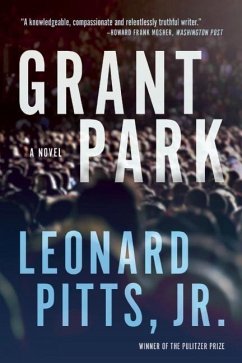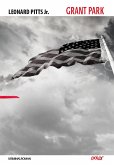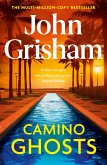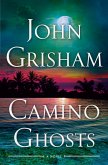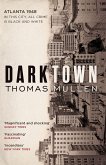"A novel as significant as it is engrossing." -Booklist, starred review
Grant Park is a page-turning and provocative look at black and white relations in contemporary America, blending the absurd and the poignant in a powerfully well-crafted narrative that showcases Pitts's gift for telling emotionally wrenching stories.
Grant Park begins in 1968, with Martin Luther King's final days in Memphis. The story then moves to the eve of the 2008 election, and cuts between the two eras. Disillusioned columnist Malcolm Toussaint, fueled by yet another report of unarmed black men killed by police, hacks into his newspaper's server to post an incendiary column that had been rejected by his editors. Toussaint then disappears, and his longtime editor, Bob Carson, is summarily fired within hours of the column's publication.
While a furious Carson tries to find Toussaintwhile simultaneously dealing with the reappearance of a lost love from his days as a 60s activistToussaint is abducted by two white supremacists plotting to explode a bomb at Barack Obama's planned rally in Chicago's Grant Park. Toussaint and Carson are forced to remember the choices they made as young men, when both their lives were changed profoundly by their work in the civil rights movement.
Hinweis: Dieser Artikel kann nur an eine deutsche Lieferadresse ausgeliefert werden.
Grant Park is a page-turning and provocative look at black and white relations in contemporary America, blending the absurd and the poignant in a powerfully well-crafted narrative that showcases Pitts's gift for telling emotionally wrenching stories.
Grant Park begins in 1968, with Martin Luther King's final days in Memphis. The story then moves to the eve of the 2008 election, and cuts between the two eras. Disillusioned columnist Malcolm Toussaint, fueled by yet another report of unarmed black men killed by police, hacks into his newspaper's server to post an incendiary column that had been rejected by his editors. Toussaint then disappears, and his longtime editor, Bob Carson, is summarily fired within hours of the column's publication.
While a furious Carson tries to find Toussaintwhile simultaneously dealing with the reappearance of a lost love from his days as a 60s activistToussaint is abducted by two white supremacists plotting to explode a bomb at Barack Obama's planned rally in Chicago's Grant Park. Toussaint and Carson are forced to remember the choices they made as young men, when both their lives were changed profoundly by their work in the civil rights movement.
Hinweis: Dieser Artikel kann nur an eine deutsche Lieferadresse ausgeliefert werden.

Leonard Pitts Jr. doziert über den elenden Rassismus
Am Abend des 4. April 1968 hält sich Martin Luther King im Lorraine Motel in Memphis auf. Er ist dort, um den Streik afroamerikanischer Müllmänner für höhere Löhne und bessere Arbeitsbedingungen zu unterstützen. Gegen sechs Uhr betritt er den Balkon des Motels - und wird erschossen. Malcolm Marcus Toussaint erlebt dieses Ereignis immer wieder. Er steht neben King, bemerkt im Augenwinkel eine seltsame Reflexion, schaut zu King herüber, macht einen Schritt auf ihn zu, weiß plötzlich, was passiert, sprintet los, reißt King zu Boden und spürt, wie eine Patrone an seiner Wange vorbeifliegt. Dann wacht er auf.
Seit mehreren Jahrzehnten wird Malcolm von diesem Traum verfolgt. Manchmal schafft er es, King zu retten, meistens jedoch scheitert er, so dass der Traum eigentlich mehr einer Erinnerung gleicht. Allerdings nicht irgendeiner, denn sie markiert den Moment des größten Rückschlags für die seit Mitte der sechziger Jahre zunehmend zersplitternde Bürgerrechtsbewegung. Das ist die eine Zeitebene, auf der sich "Grant Park", der dritte Roman des mit dem Pulitzer-Preis ausgezeichneten Journalisten Leonard Pitts Jr., bewegt. Die andere spielt 2008 und widmet sich jenem historischen Augenblick, der die vierzig Jahre währende Latenz dazwischen wiedergutzumachen scheint: Barack Obamas Wahl zum Präsidenten der Vereinigten Staaten.
An Malcolm hat diese Zeit unerbittlich genagt. Er ist sechzig, sieht aus wie siebzig und fühlt sich wie achtzig. Seine Frau lebt nicht mehr, und die Kinder sehen in ihm einen Mann, der nichts dringender benötigt als den vorgezogenen Ruhestand. Und den organisiert er sich mit einem Coup. Für seinen Arbeitgeber, die "Chicago Post", hat er eine Kolumne geschrieben, die von seinem Vorgesetzten abgelehnt worden ist. Also macht er sich zu später Stunde noch einmal auf den Weg in die Redaktion, betritt den verlassenen Newsroom, fährt den Computer des Chefs hoch, loggt sich mit dessen Passwort ein, entfernt eine Agenturmeldung von der Titelseite der kommenden Ausgabe, und fügt seinen Text dort ein.
Am nächsten Morgen sehen sich die Zeitungsleser mit Sätzen wie diesem konfrontiert: "Ich habe die Nase voll vom Bullshit der Weißen." Oder diesem: "Ich will einfach kapitulieren, mich öffentlich von der hirnrissigen Idee verabschieden, dass Weiße erlöst werden können, dass sie zum Umdenken gebracht werden können und ein für alle Mal die idiotische Selbsttäuschung überwinden, dass Melanin und Intelligenz, Moral oder Wert irgendwie zusammenhängen." Um seine Überzeugung zu untermauern, zitiert Malcolm noch aus einem rassistischen Leserbrief und redet dessen Verfasser direkt an: "Und jetzt fahren Sie bitte zur Hölle und nehmen Sie Amerika gleich mit."
Am Publikationstag dieser Entladung wird Malcolm von zwei soziopathischen Rassisten entführt, die ein Attentat auf Barack Obama planen. Sein weißer Chef, der die Kolumne ausgemustert hat, war vor vierzig Jahren mit einer Schwarzen liiert, die er nun wiedertrifft. Das Date hat allerdings nur eine begrenzte Halbwertszeit, denn auch sie wird von den beiden Rassisten gekidnappt. Der Rest ist Thriller-Routine: Fahndung, Prügeleien, Hinrichtungen.
Leider kommen die komplex angelegten Figuren nicht richtig zur Entfaltung, weil sie in erster Linie Träger von Ideen sind. Wir treffen auf kämpferische und friedliche Bürgerrechtler, passionierte und verkappte Rassisten. Wir lernen, dass politisch richtige Haltungen zu privaten Katastrophen führen können. Und wir realisieren, eher früher als später, dass Pitts seinen reichhaltigen Stoff auf nur einen Fluchtpunkt hin konzipiert hat: den elenden Rassismus. Haben wir das didaktische Moment erst einmal erkannt, wirkt auch die von Malcolm vorgebrachte Kulturkritik nicht länger wie eine zu ihm gehörende Marotte, sondern wie ein Anliegen des Autors: "Plötzlich reichte es nicht mehr aus, sein Bestmögliches zu geben, seine Arbeit zu machen, sie zu veröffentlichen und dann für sich sprechen zu lassen. Auf einmal sollte man eine Facebook-Seite pflegen und E-Mails beantworten und Forendiskussionen moderieren."
Pitts nutzt seinen gut konstruierten Roman als Abladefläche für Anschauungen aller Art. Er produziert, anders gesagt, Bekenntnis- und Gesinnungslehren, die der ästhetischen Potenz seines Werks immer wieder den Garaus machen. Etliche Passagen lassen vermuten, der Autor feile an einem neuen Genre - dem literarischen Sachbuch. Satzanfänge klingen dann so: "In einer Zeit, in der man sich auf immer weniger verlassen konnte (...) In einer Zeit medialen Getöses, in der niemand mehr zuhörte". Der Eifer des Dozenten macht auch vor den Figurennamen nicht halt. Der Protagonist etwa entpuppt sich als Amalgam aus Malcolm X, Marcus Garvey und Toussaint Louverture. Pitts versäumt es selbstverständlich nicht, uns zu erklären, was das für Menschen waren. Aber Literatur muss mehr sein als Geschichtsunterricht.
KAI SPANKE
Leonard Pitts Jr.: "Grant Park". Kriminalroman.
Aus dem Amerikanischen von Andrea Stumpf und Gabriele Werbeck.
Polar Verlag, Hamburg 2018. 550 S., geb., 22,- [Euro].
Alle Rechte vorbehalten. © F.A.Z. GmbH, Frankfurt am Main
Praise for Leonard Pitts, Jr.'s novel GRANT PARK:
"Grant Park is layered, insightful, and passionate. Pitts's subtly explosive language grips readers with the delicate subject matter and earnestly implores them to understand that '[race] has always meant something and it always will.' The scars will remain, but stunningly powerful examinations like Grant Park can be the salve that helps heal open wounds." Shelf-Awareness, starred review
"Leonard Pitts has written a taut thriller that weaves together a stark look at America's tortured racial past with a fast-paced tale of terrorist conspiracy and love rekindled." Neil Steinberg, Chicago Sun Times
. . . these ideas [are] perennially salient, and doubly so today, given a growing litany of American sorrows, from Ferguson to Charleston and beyond. . . . lays bare the extent to which Americans, black and white, still struggle to articulate the basic elements of our shared past." Vinson Cunningham, New York Times Book Review
"The book is a page-turner, but also one that commands deep reflection on history, racism, and personal choices." Blanca Torres, The Seattle Times
"A novel as significant as it is engrossing." Booklist, starred review
"Pitts masterfully revisits [election night on November 4, 2008] and four decades of the civil rights struggle to create one of the most suspenseful and spectacular fictitious moments you'll experience this fall." Patrik Henry Bass, Essence
"Pitts does a skillful job of building tension in the novel's historical sections as well as on Election Day. . . . He also does something not every political thriller writer does: builds believable, complex characters." Colette Bancroft, Tampa Bay Times
"[A] high-stakes, hard-charging political thriller. . . . The sharply etched characters, careful attention to detail, and rich newspaper lore propel Pitts's socially relevant novel." Publishers Weekly
"And then there are those thrillsgasping, mouth-gaping page-turners that author Leonard Pitts Jr. weaves through another realism: truthful, brutal plot-lines about racial issues of the last five decades, mulling over exactly how far we've really come. That makes this will-they-live-or-won't-they nail-biter into something that also made me think, and I absolutely loved it." Terri Schlichenmeyer, The Bookworm Sez
"An important book, one that honestly examines the current, tumultuous racial divide in our country and demands we not turn away from its harsh realities." Amy Canfield, Miami Herald
"Grant Park is a book that's both socially relevant and a lot of fun." NewCity
"In the aftermath of this summer's racially motivated mass murder in Charleston, South Carolina, by an avowed white supremacist, there's near-eerie prescience in Pitts' historical novel. . .[Grant Park], with urgency and passion, makes readers aware that the mistakes of the past are neglected at the future's peril." Kirkus Reviews
"Grant Park is a monumental work, so all-encompassing in scope that reviewers will be hard-pressed to do it justice. Pitts's passion for a solution holds strong to the end of his novel even as his central character seems to give up. Readers will find Grant Park is real." Bookpleasures.com
"Grant Park is a thriller, and readers will find themselves turning pages accordingly, although the interior stories of Bob and Malcolm regarding their younger selves may be the real action." Brian Burnes, The Kansas City Star
Praise for Leonard Pitts, Jr.'s previous novel FREEMAN:
"A uniquely American epic. . . by a knowledgeable, compassionate and relentlessly truthful writer." Howard Frank Mosher, Washington Post
"A pretty powerful love story." Audie Cornish, All Things Considered
"Gorgeously written; a searing, wrenching read. Fans of Cold Mountain and Cormac McCarthy will love this story." Jennifer Weiner, author of The Next Best Thing
"Leonard Pitts has a passion for history and a gift for storytelling. Both shine in this story of love and redemption." Gwen Ifill, PBS, author of The Breakthrough
"Freeman is a myth of what's humanly possible, a needed story about little-known heroism, and a shadow thrown forward to the struggles of American families in the 21st century." John Timpane, Philadelphia Inquirer
"A wonderful, moving, riveting novel." Gabrielle Union, actress
"Post-Civil War America is fertile ground for novelists, but few have tilled it with such grace and majesty as Leonard Pitts." Herb Boyd, co-editor of By Any Means NecessaryMalcolm X: Real, not Reinvented
"This book is an eye-opening commentary on devotion during this tangled chapter of American history." Wendi Thomas, Memphis Commercial Appeal
"Leonard Pitts, Jr. crafts a novel as well as the great storytellers of our time. Freeman captured my attention from the very first sentence and my heart throughout." Sybil Wilkes, The Tom Joyner Morning Show
"Freeman reminds us of our humanity." Nancy Olson, owner of Quail Ridge Books, Raleigh, North Carolina
"Grant Park is layered, insightful, and passionate. Pitts's subtly explosive language grips readers with the delicate subject matter and earnestly implores them to understand that '[race] has always meant something and it always will.' The scars will remain, but stunningly powerful examinations like Grant Park can be the salve that helps heal open wounds." Shelf-Awareness, starred review
"Leonard Pitts has written a taut thriller that weaves together a stark look at America's tortured racial past with a fast-paced tale of terrorist conspiracy and love rekindled." Neil Steinberg, Chicago Sun Times
. . . these ideas [are] perennially salient, and doubly so today, given a growing litany of American sorrows, from Ferguson to Charleston and beyond. . . . lays bare the extent to which Americans, black and white, still struggle to articulate the basic elements of our shared past." Vinson Cunningham, New York Times Book Review
"The book is a page-turner, but also one that commands deep reflection on history, racism, and personal choices." Blanca Torres, The Seattle Times
"A novel as significant as it is engrossing." Booklist, starred review
"Pitts masterfully revisits [election night on November 4, 2008] and four decades of the civil rights struggle to create one of the most suspenseful and spectacular fictitious moments you'll experience this fall." Patrik Henry Bass, Essence
"Pitts does a skillful job of building tension in the novel's historical sections as well as on Election Day. . . . He also does something not every political thriller writer does: builds believable, complex characters." Colette Bancroft, Tampa Bay Times
"[A] high-stakes, hard-charging political thriller. . . . The sharply etched characters, careful attention to detail, and rich newspaper lore propel Pitts's socially relevant novel." Publishers Weekly
"And then there are those thrillsgasping, mouth-gaping page-turners that author Leonard Pitts Jr. weaves through another realism: truthful, brutal plot-lines about racial issues of the last five decades, mulling over exactly how far we've really come. That makes this will-they-live-or-won't-they nail-biter into something that also made me think, and I absolutely loved it." Terri Schlichenmeyer, The Bookworm Sez
"An important book, one that honestly examines the current, tumultuous racial divide in our country and demands we not turn away from its harsh realities." Amy Canfield, Miami Herald
"Grant Park is a book that's both socially relevant and a lot of fun." NewCity
"In the aftermath of this summer's racially motivated mass murder in Charleston, South Carolina, by an avowed white supremacist, there's near-eerie prescience in Pitts' historical novel. . .[Grant Park], with urgency and passion, makes readers aware that the mistakes of the past are neglected at the future's peril." Kirkus Reviews
"Grant Park is a monumental work, so all-encompassing in scope that reviewers will be hard-pressed to do it justice. Pitts's passion for a solution holds strong to the end of his novel even as his central character seems to give up. Readers will find Grant Park is real." Bookpleasures.com
"Grant Park is a thriller, and readers will find themselves turning pages accordingly, although the interior stories of Bob and Malcolm regarding their younger selves may be the real action." Brian Burnes, The Kansas City Star
Praise for Leonard Pitts, Jr.'s previous novel FREEMAN:
"A uniquely American epic. . . by a knowledgeable, compassionate and relentlessly truthful writer." Howard Frank Mosher, Washington Post
"A pretty powerful love story." Audie Cornish, All Things Considered
"Gorgeously written; a searing, wrenching read. Fans of Cold Mountain and Cormac McCarthy will love this story." Jennifer Weiner, author of The Next Best Thing
"Leonard Pitts has a passion for history and a gift for storytelling. Both shine in this story of love and redemption." Gwen Ifill, PBS, author of The Breakthrough
"Freeman is a myth of what's humanly possible, a needed story about little-known heroism, and a shadow thrown forward to the struggles of American families in the 21st century." John Timpane, Philadelphia Inquirer
"A wonderful, moving, riveting novel." Gabrielle Union, actress
"Post-Civil War America is fertile ground for novelists, but few have tilled it with such grace and majesty as Leonard Pitts." Herb Boyd, co-editor of By Any Means NecessaryMalcolm X: Real, not Reinvented
"This book is an eye-opening commentary on devotion during this tangled chapter of American history." Wendi Thomas, Memphis Commercial Appeal
"Leonard Pitts, Jr. crafts a novel as well as the great storytellers of our time. Freeman captured my attention from the very first sentence and my heart throughout." Sybil Wilkes, The Tom Joyner Morning Show
"Freeman reminds us of our humanity." Nancy Olson, owner of Quail Ridge Books, Raleigh, North Carolina

